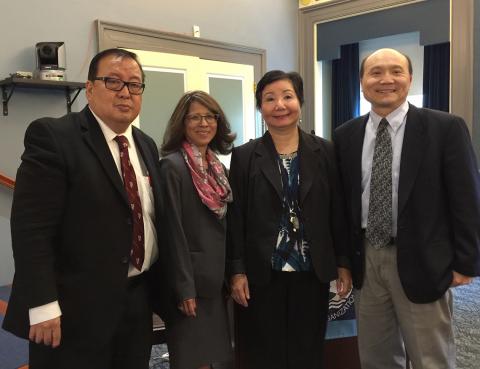Observing Asian American Heritage
‘Diverse Career Pathways’ Panelists Discuss Roads to Success

Photo: Phuong-Tu Le
Three senior NIH staff shared their personal career paths at a May 4 panel discussion—one of the NIH activities in observance of Asian and Pacific Islander Heritage Month. The audience of more than 50 gained insights on how to build a successful scientific or administrative career.
Robin Kawazoe stressed the importance of learning as much as you can. Embrace challenges that come your way, she said, and make them opportunities to grow. She started in extramural and policy committee management and over the years took on increasing responsibilities in science policy and communications (NIDA) and science policy and planning (OD). She later built up resource management experience at NIAAA. In her current position as deputy director of the NIH Division of Program Coordination, Planning & Strategic Initiatives, Kawazoe said her duties overlap the administrative and science spheres—workforce development; ethics; space management; and risk management, internal controls and crisis response. By learning and sharing knowledge, she emphasized, one becomes the “go-to” person who is valuable to one’s organization.
The second speaker, Dr. T. Jake Liang, transitioned from academia to NIH, where he currently serves as chief of the Liver Diseases Branch in NIDDK’s Division of Intramural Research. He stressed the value of being active in professional societies and in editorial work for scientific journals, which he has continuously done from the time he was assistant professor of medicine at Harvard Medical School (1990-1996).
Taking charge of one’s career path, Liang said, entails setting a goal: Be ambitious but realistic. Stay focused and always seek advice. Re-assess periodically to see if you are on track. Even when experiencing success, don’t sit on your laurels; start again and set a new goal. Always be respectful, honest and sincere, he said, because being principled is at the core of reputation and gaining peer support.
Even when situations are not ideal, it is important to avoid adversarial relationships. Life-long relationships, built in the workplace and in professional and social networks, are key to one’s career, Liang said, noting that the benefit goes in both directions.
The third speaker, Dr. Francisco Sy, described his path from academia to the Centers for Disease Control and Prevention to NIH, and then back to academia, after he retires as program director of the Division of Extramural Scientific Programs, NIMHD. His key message was to “be your own champion.”
At CDC, Sy was working in HIV/AIDS education and prevention when the 2003 SARS outbreak occurred in Asia. With little initially known about disease transmission, he felt it was important to mitigate fear and negative impact on Asian communities and businesses in the U.S. By volunteering to lead the CDC SARS community outreach team, he created an unanticipated opportunity.
Seeking out new knowledge can involve being an “intellectual risk taker,” he said. Moreover, even if culturally or personally one feels it awkward, being proactive and showing initiative is important. Sometimes, he said, one’s supervisor may simply be unaware that you might be interested in taking on a project.
Echoing the other speakers, Sy urged each person to continually assess where one is, while mapping out a plan to reach one’s goal. He added that a leader promotes participation, consensus and teamwork among colleagues.
A brief question and answer period concluded the panel discussion, which was co-sponsored by the NIH Asian & Pacific Islander American Organization (APAO) and the NIH Office of Equity, Diversity and Inclusion.
